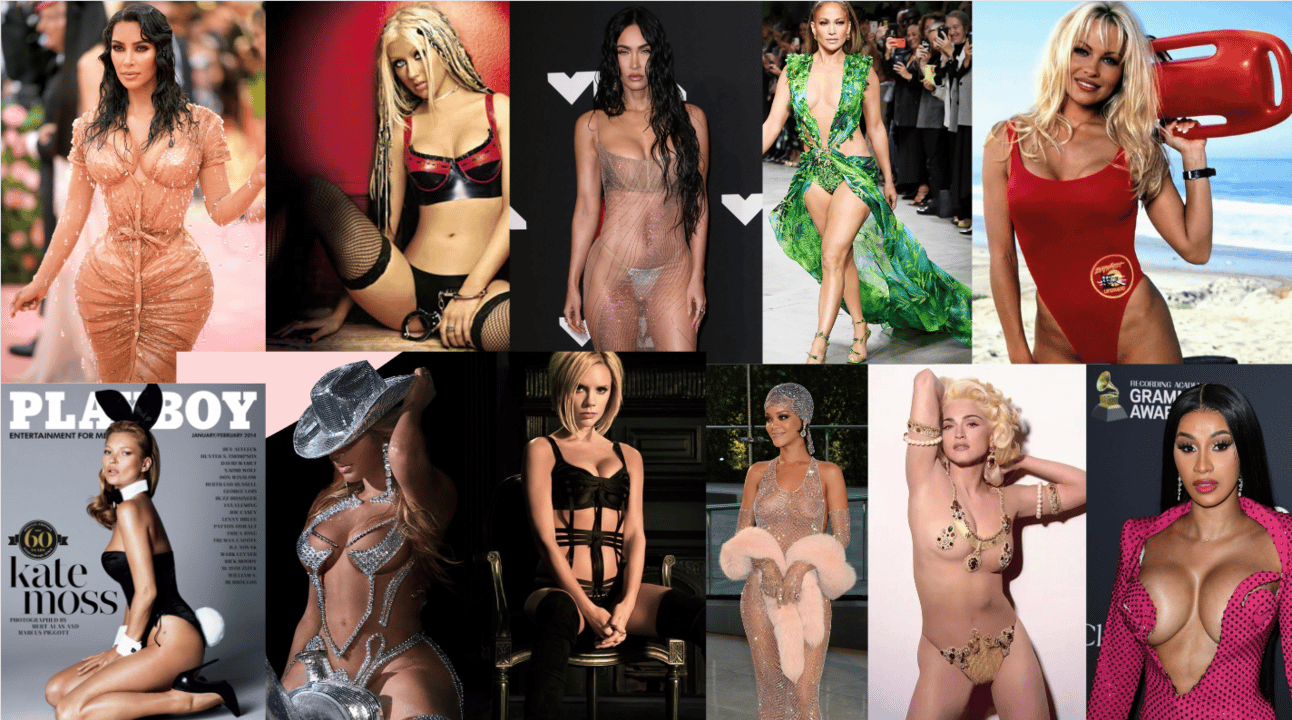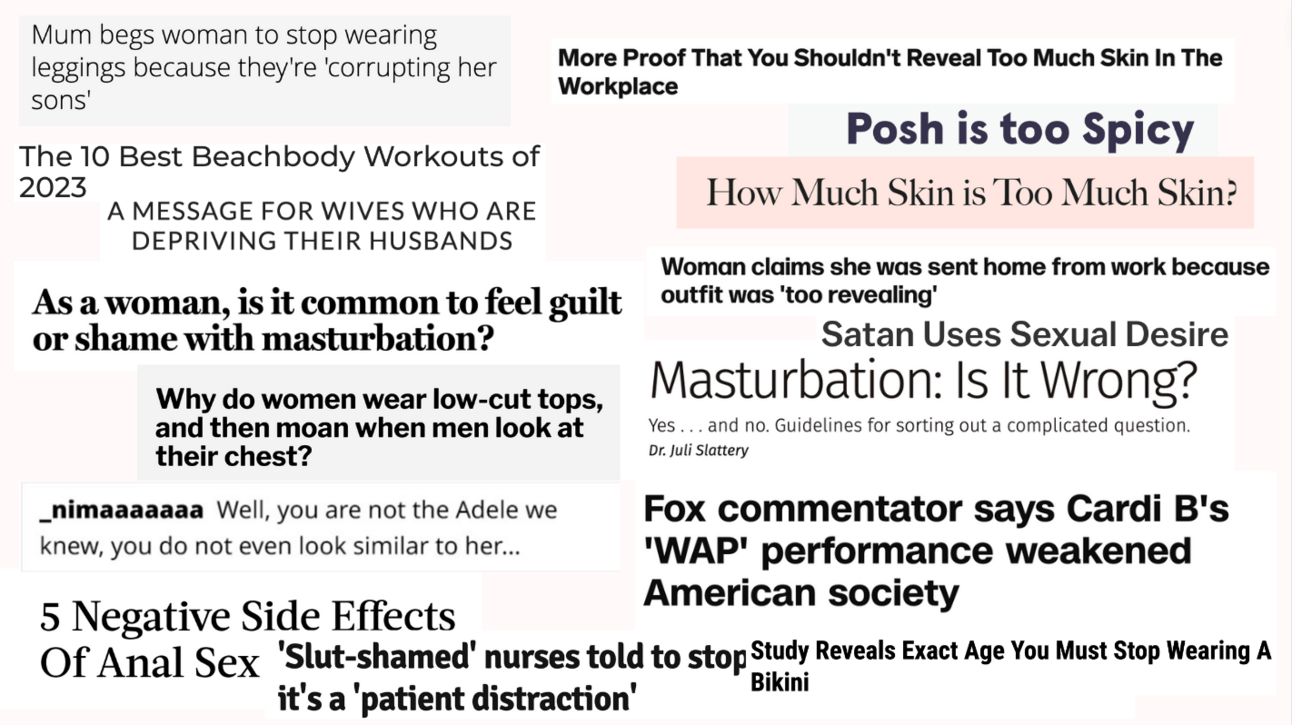Hey kiddos! 👋
Here’s your weekly dose of Pillow Talk. Based on overwhelming demand and limited spots for our 1:1 sessions, we’re super excited to open up the following 2 offers to the broader community 🎉
More details below 💗 As for this week’s read…
Many of us have grown up with, and continue to get bombarded by, mixed messages about what it means to be ‘sexually empowered’. On one hand, we’ve got cultural icons like these…

And on the other hand, we’re bombarded by messages like these…

It’s overwhelming AF and can feel near impossible to get it ‘right’. From what a sexual woman ‘should’ look like to what sexual acts we ‘shouldn’t’ do, it’s no wonder so many of us struggle with sexual confidence.
Top that off with all the contradictory rules about sex (and our bodies) and we’ve got the perfect breeding ground for today’s topic: sexual shame.
Shame vs. Guilt - What’s the Difference?
It can be hard to separate shame and guilt, especially when stuck in their 🌀s. So here are some key differences…
Shame
A deeply negative and self-conscious emotion related to our sense of self-worth and identity.
The “intensely painful belief that we are flawed, not good enough or that something is wrong with us.” - Brené Brown
Focuses on the whole self instead of specific actions/behaviors.
A pervasive and chronic feeling that impacts various aspects of our lives, e.g. relationships, self-esteem, and overall wellbeing.
Guilt
A moral or ethical emotion that arises from the belief that we’ve done something wrong (i.e. harmful, hurtful, etc.) or violated our own internal standards or values.
Typically associated with a specific action or behavior (vs. our entire sense of self-worth).
It can serve as a signal to correct our behavior, make amends, or take responsibility for our action(s).
The Origins of Sexual Shame
More specifically, sexual shame is the deep-rooted belief that our sexual desires, preferences, experiences, etc. are somehow wrong, flawed or even immoral.
Sexual shame is the partner who doesn’t want ‘enough’ sex. It’s the partner who wants sex ‘too much’. It’s a sexless relationship(s). It’s infidelity. It’s not masturbating because you were taught it’s dirty. It’s painful sex or not being able to regularly orgasm (if at all). It’s infertility. It’s wanting to try X or Y. It’s being naked….
Sexual shame is shaped by our individual sexual beliefs. These are the ideas, attitudes, and values that we have about sexuality. They’re influenced by our familial, cultural, societal and religious environments as well as our upbringings. Traumatic experiences can very much shape these beliefs too, e.g. an unhelpful belief of “If I had done X or been more Y, then Z wouldn’t have happened.”
Letting Go of Sexual Shame
The antidote to shame is vulnerability and empathy - towards your shame, yourself and others. Shame, whilst felt collectively, is also inherently individual. This is why there’s no one-size-fits-all approach. That being said, there are some actions you can start practicing to help let go of it:
Acknowledging and challenging disempowering beliefs. Questioning their origins and recognizing that your feelings, desires and experiences are valid.
Practicing self-compassion by embracing your sexuality as an essential part of who you are and that like you, it is deserving of respect. Offering yourself forgiveness, love, and acceptance.
Educating yourself about the wide spectrum of sexual expression so you can start to dismantle shame-based narratives.
Connecting with others and having open conversations around sex and sexuality. Sharing thoughts, feelings, experiences, etc. can provide validation, acceptance, and a sense of belonging.
Getting therapy or support from professionals who can provide guidance, tools, and a safe space to explore and heal.
1 Thing to Try This Week
Choose one aspect of your sexuality that you have previously shamed. Make a list of 5-10 beliefs you have about it. Identify any disempowering beliefs and reflect on where these might come from. Now, practice rewriting them to be more empowering.
2 Questions to Ponder
How, if at all, does shame (sexual and otherwise) show up in my life?
How, if at all, would my life be different if I reframed any beliefs I have that contribute to creating shame?
3 Read/Watch/Listens (all Brenés this week ❤️)
👩🏫 Check out Ferly’s Cultivate Desire 8 Week Program
🎧 Striving versus Self-Acceptance, Saving Marriages, and More - Tim Ferriss & Dr. Brené Brown
👀 The Power of Vulnerability TED talk by Dr. Brené Brown

The Scoop on Ferly’s ‘Gym’ and Cultivate Desire Program
The Ferly Gym membership gives you access to weekly sessions which include coaching, Q&As and deep dive masterclasses. You’ll also get unlimited email support from Ferly’s Co-Founders and big discounts to all of our future courses.
The Cultivate Desire program is a structured 8 week course and online resource hub, which goes deep into topics like desire, orgasm, confidence and communication. It also includes a Gym Membership for the duration of the program (two months). It's the best of both worlds!
Pricing is as follows:
Gym Membership Options:
Cultivate Desire 8 Week Program
Note: paying in two instalments is possible just drop us an email 💌
Women come to us feeling broken and alone. After just 8 weeks, they feel sexy, confident and empowered. They leave us so excited about their sex and relationships! The shift is profound because our process is effective ⚡️
When you’re ready, click on the pricing links above. The discounted pricing will apply until the end of June.
Hope to see you on the inside - enjoy the rest of your week!

p.s. Here’s the course brochure for Cultivate Desire incase you wanna take a 👀
